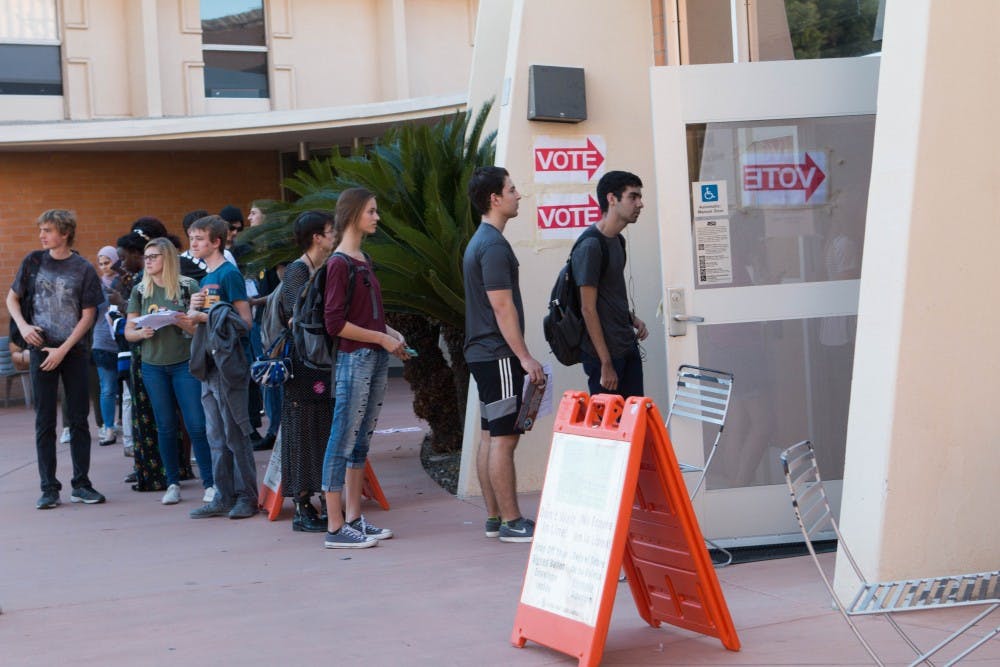Undergraduate Student Government Tempe progresses slowly to create, install and implement the tangible pieces from resolutions passed last semester that encourage civic engagement.
Legislation proposed by Barrett, The Honors College Senator Katherine Hostal, a sophomore studying finance, reflected repeated conversations with the University and the civic engagement platform that the executive office ran on in Spring 2019.
The Removing Voting Barriers Act, Senate Resolution 7, urges the University to prevent exams from being scheduled on Election Day. In addition, the resolution asks the University to waive any academic punishments for students who miss class to vote.
The Voting Locations Act, Senate Resolution 8, asks the University to work with the Maricopa County Recorder’s Office to install a vote center, rather than polling location, on campus for federal elections beginning with the 2020 presidential election.
With just one more day until the first of many elections to be held in Arizona, one resolution isn't new and the other has yet to be fully implemented on campus.
SR 8, to bring a vote center to campus, is not a new idea. Vote centers and polling locations have been set up on the Tempe campus for University students in past elections and will be a part of the plan for Tuesday's preference election.
A vote center, like the one on campus, is open to any eligible voter in the county. Members of the community can go to the center, request a ballot and cast their vote. A polling location is assigned to individual voters and is typically utilized for hyper-local elections.
READ MORE: USGT passes resolution to increase voting opportunities on campus
The resolutions are just one part of USGT's attempt to "promote students having participation in government," Hostal said.
In the process of drafting the legislation, Hostal met with political student groups like NextGeneration ASU to get different stakeholder perspectives.
"USG has been so helpful, and they really worked with us a lot and cared about all of our input," said University alumna Jordan Iglesias, the NextGen regional organizing director overseeing ASU and NAU NextGen America chapters.
Since the passage of the resolutions, USGT has worked with the Faculty Senate and USG branches on the other three campuses in hopes that they will pass similar legislation, sending a clear message to the University that civic engagement is a student body priority.
"I met with the University Senate Student-Faculty Policy Committee to discuss our goals and aspirations in more detail," said Trey Leveque, USGT vice president of policy and junior studying business, in an email.
In order to make civic engagement a priority, USGT partnered with the Maricopa County Recorder’s Office on Feb. 15 to host a town hall discussing the details of the presidential preference election.
READ MORE: Town hall displays new technology ahead of elections
In addition, USGT has offered two three-hour voter registration training events and worked with the County Recorder to place a vote center within Tempe’s Sun Devil Fitness Complex for the presidential preference election.
"We want to make sure that all students and community members are given the opportunity to participate in elections," Leveque said in an email.
The resolutions are extensions of not just conversations with the University, but a broader campaign to get more students to vote and participate.
The focus on civic engagement has already seen increased participation. According to a report by the National Study of Learning, Voting, and Engagement, the voting rate of ASU students who were registered increased 32% between 2014 and 2018.
The report also found that the number of students who registered in 2018 was 41,286, about 28,000 more registered students than in 2014.
While SR 8 seems to have already made a real impact, SR 7, asking the University to cancel classes and remove punishments for students who vote, has remained more stagnant.
Organizers who worked to push for the resolution, such as NextGen ASU, are disappointed in the University's collaboration with student government.
"I think the University needs to make it easier for these initiatives to occur in a timely manner," Iglesias said, adding that she was frustrated with top-down organization of decision making.
Iglesias said that a resolution involving the faculty and the class schedule could have been a more grassroots, student-led initiative rather than a bureaucratic process.
Despite slow conversations with the Faculty Senate's members, USGT members believe that what they've done so far is a step in the right direction.
"From our vantage point, we have done everything we can to promote voter registration, upcoming elections, civic habits and even included civic engagement as the Council of Presidents' top five priorities for the academic year," Hanna Salem, USGT president and a senior studying public service and public policy, said in an email.
While there is more legislation being discussed in the Arizona Legislature that may impact student voting, USGT can only work so fast.
Hostal said addressing new state legislation while trying to increase civic engagement and protect the right to vote at the campus level is "something we have to discuss."
"There's always more to be done," Hostal said. "We're always working to be better."
Reach the reporter at pjhanse1@asu.edu and follow @piperjhansen on Twitter.
Like The State Press on Facebook and follow @statepress on Twitter.

Piper Hansen is the digital editor-in-chief at The State Press, overseeing all digital content. Joining SP in Spring 2020, she has covered student government, housing and COVID-19. She has previously written about state politics for The Arizona Republic and the Arizona Capitol Times and covers social justice for Cronkite News.




